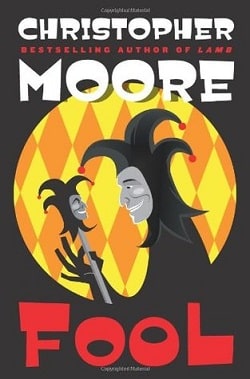Christopher Moore's Fool is a riotous romp through the dark and twisted world of Shakespeare's King Lear, reimagined through the eyes of Pocket, the king's jester. Moore, known for his sharp wit and irreverent humor, takes the classic tragedy and infuses it with a fresh perspective, transforming it into a tale that is as hilarious as it is insightful. This novel is not just a retelling; it is a bold exploration of themes such as loyalty, betrayal, and the absurdity of power, all wrapped in a package of outrageous comedy.
At the heart of Fool is Pocket, a character who embodies the duality of the jester's role in Shakespearean plays—both a fool and a sage. Moore masterfully develops Pocket's character, allowing readers to witness his evolution from a mere entertainer to a pivotal player in the political machinations of Lear's court. Pocket's sharp tongue and quick wit serve as both a defense mechanism and a means of survival in a world where the stakes are perilously high. His observations about the absurdities of the nobility and the folly of human nature resonate throughout the narrative, providing a lens through which the reader can examine the darker aspects of the human condition.
The novel's humor is unapologetically crude and irreverent, filled with “gratuitous shagging, murder, spanking, maiming, treason,” and a plethora of profanities that would make even the most seasoned reader blush. Yet, it is this very vulgarity that serves to highlight the absurdity of the situations Pocket finds himself in. Moore's comedic style is reminiscent of the likes of Terry Pratchett and Douglas Adams, where the outrageous becomes a vehicle for deeper commentary on society and human behavior. The humor is not merely for shock value; it is intricately woven into the fabric of the narrative, enhancing the reader's engagement with the characters and their plights.
One of the most compelling aspects of Fool is its exploration of loyalty and betrayal. As Pocket navigates the treacherous waters of Lear's court, he is faced with the challenge of remaining loyal to a king who is increasingly losing his grip on reality. The relationships between characters are fraught with tension, and Moore deftly illustrates how power dynamics shift and change, often leading to betrayal in the most unexpected ways. This theme resonates with contemporary audiences, as it reflects the complexities of loyalty in a world where personal ambition often trumps allegiance.
Moore's portrayal of Lear himself is particularly noteworthy. In Fool, Lear is not just a tragic figure; he is a man grappling with his own mortality and the consequences of his decisions. The jester's interactions with Lear provide a unique perspective on the king's descent into madness, allowing readers to empathize with a character who is often seen as a villain in the original play. This nuanced portrayal adds depth to the narrative, inviting readers to consider the fragility of power and the human condition.
The supporting characters in Fool are equally well-developed, each contributing to the chaotic tapestry of the story. From the scheming Goneril and Regan to the loyal Kent, Moore breathes life into these familiar figures, giving them new dimensions and motivations. The interplay between these characters creates a rich narrative landscape, filled with intrigue and unexpected twists that keep readers on their toes. Moore's ability to balance humor with genuine emotional stakes is a testament to his skill as a storyteller.
Moreover, the novel's pacing is expertly crafted, with each chapter building upon the last to create a sense of urgency and excitement. Moore's writing is both accessible and engaging, making it easy for readers to become immersed in the world he has created. The dialogue is sharp and witty, often eliciting laughter while simultaneously prompting deeper reflection on the themes at play. This balance of humor and poignancy is a hallmark of Moore's work, and it shines brightly in Fool.
In comparison to other modern retellings of Shakespeare's works, such as Vinegar Girl by Anne Tyler or Hag-Seed by Margaret Atwood, Fool stands out for its unabashed embrace of absurdity and vulgarity. While other authors may take a more subdued or serious approach, Moore revels in the chaos, inviting readers to laugh at the folly of humanity while also reflecting on the deeper truths that lie beneath the surface. This unique approach makes Fool a refreshing addition to the canon of Shakespearean adaptations.
Ultimately, Fool is a testament to Christopher Moore's talent as a writer and his ability to blend humor with profound insights into the human experience. The novel is a wild ride filled with laughter, heartache, and a healthy dose of irreverence. It challenges readers to reconsider the nature of loyalty, the absurdity of power, and the complexities of human relationships, all while delivering a story that is thoroughly entertaining. For those who appreciate a good laugh intertwined with thought-provoking themes, Fool is a must-read.
In conclusion, Christopher Moore's Fool is a brilliant and hilarious reimagining of a classic tale, showcasing the author's unique voice and unparalleled wit. It is a book that will resonate with fans of Shakespeare, lovers of comedy, and anyone looking for a story that is both entertaining and thought-provoking. Whether you are a longtime Moore fan or new to his work, Fool promises to deliver a reading experience that is as enjoyable as it is enlightening.










![My Family is Obsessed with Me [ Sugar Babies ]](/upload/pic/manga/my-family-is-obsessed-with-me---sugar-babies--.jpg)













Reviews 0
Post a Reviews: